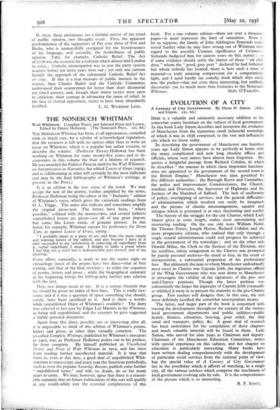EVOLUTION OF A CITY
HERE is a valuable and eminently necessary addition to the somewhat scanty literature on the subject of local government. In this book Lady Simon describes and interprets the evolution of Manchester from the numerous small industrial townships Of which it was in 1838 composed, to the vast and influencial city which we know today.
In describing the government of Manchester one hundred years ago Lady Simon appears to be perfectly at home with the many complicated and now long obsolete offices and officials, whose very names have almost been forgotten. She quotes a delightful passage from Richard Cobden, in which he describes " the manner in which these important function- aries are appointed to the government of the second town in the British Empire." Manchester was then governed by five different authorities : the Borough Reeve and Constables, the police and improvement Commissioners, the Church- wardens and Overseers, the Surveyors of Highways and the Justices of the Hundred of Salford. The lack of uniformity of policy, overlapping of services, and the general difficulties of administration which resulted can easily be imagined, and the picture of chaotic mismanagement, squalor and intrigue which is portrayed is at once fascinating and sordid.
The history of the struggle for the city Charter, which Lady Simon gives at some length, makes most entertaining and interesting reading. On the one side were William Neild, Sir Thomas Potter, Joseph Heron, Richard Cobden and the more progressive citizens, who realised -that only through a single central administration could real progress be achieved in the government of the townships ; and on the other side Oswald Milne, the Clerk to the Justices of the Division, and his satellites, whose antagonism to the Charter was prompted by purely personal motives—he stood to lose, in the event of incorporation, a substantial proportion of his professional fees. But ultimately the man to whom Manchester undoubtedly most owed its Charter was Captain Jebb, the ingenious official of the Whig Government who was sent down to Manchester to investigate the validity of the signatures of the pro- and anti-Charter petitions. Though the latter petition was substantially the larger the ingenuity of Captain Jebb eventually so whittled it away as to present the majority to the pro-Charter group. Few readers will disagree that, in this case, the end most definitely justified the somewhat unscrupulous means.
The latter, and larger part of the book is concerned with tracing the development throughout the century of the various local government departments and public utilities—public health, finance, education, housing, poor relief, the ship canal and transport, police, &c. A great deal of research has been undertaken for the compilation of those chapters and much valuable material will be found in them. Lady Simon, who served for nine years as Chairman and deputy- Chairman of the Manchester Education Committee, writes with special experience on this subject, and her chapter on education is particularly interesting. Many books have been written dealing comprehensively with the development of particular social services from the national point Of view, but the special value of A Century of City Government lies in the possibility which it affords of watching, in a single city, all the various services which comprise the machinery of local government evolving side by side. It is the compositeness of the picture which is so interesting.
R. F. SCOTT.


















































 Previous page
Previous page